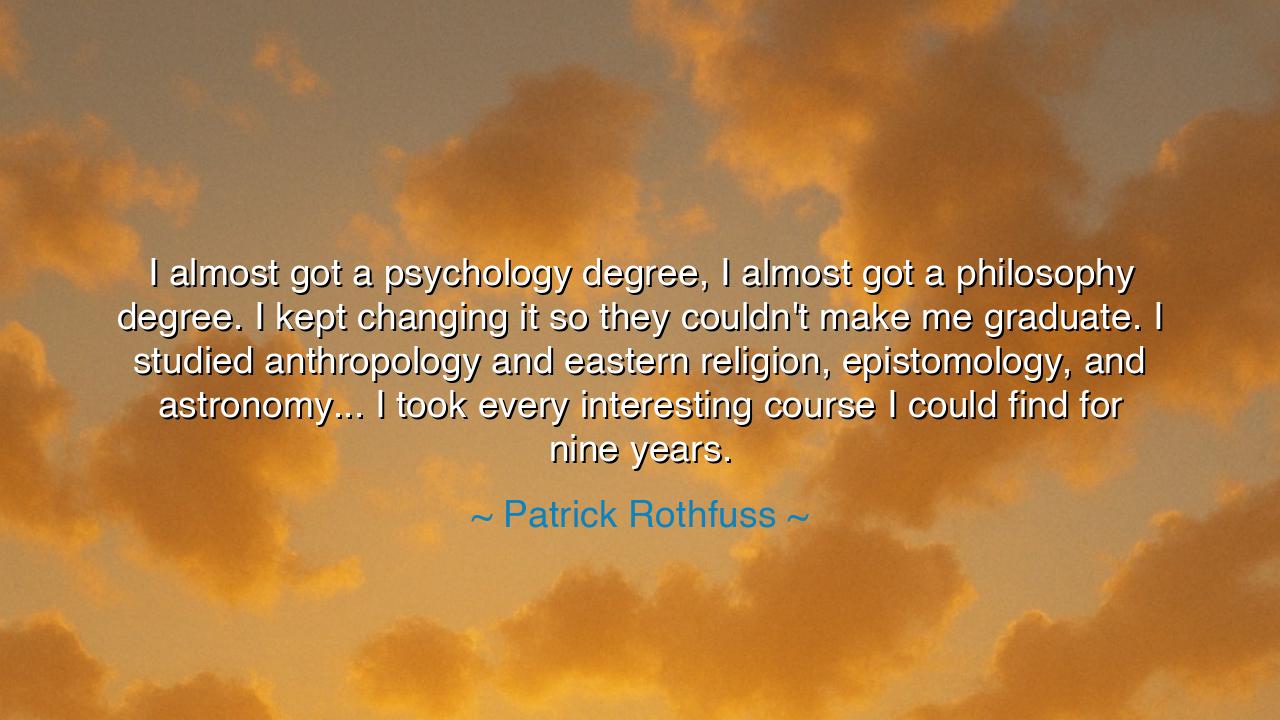
I almost got a psychology degree, I almost got a philosophy
I almost got a psychology degree, I almost got a philosophy degree. I kept changing it so they couldn't make me graduate. I studied anthropology and eastern religion, epistomology, and astronomy... I took every interesting course I could find for nine years.






The words of Patrick Rothfuss — "I almost got a psychology degree, I almost got a philosophy degree. I kept changing it so they couldn't make me graduate. I studied anthropology and eastern religion, epistemology, and astronomy... I took every interesting course I could find for nine years." — ring with the voice of a seeker, one who chose not to be bound by the rigid walls of achievement, but to wander in the vast wilderness of knowledge. In his confession there is humor, yes, but also a deep truth: that the pursuit of wisdom is greater than the pursuit of credentials, and that a curious mind, unfettered by the race to graduate, can drink deeply from many wells.
The origin of this statement lies in Rothfuss’s own journey, a writer whose tales are woven with the richness of myth, philosophy, and human longing. His refusal to graduate was not born from rebellion alone, but from a desire to linger in the garden of learning without being hurried out by the demands of the world. He sought breadth rather than speed, depth rather than efficiency. For him, the classroom was not a cage to be escaped, but a temple in which he could wander from altar to altar, studying the mysteries of psychology, philosophy, anthropology, religion, and the stars themselves.
History shows us that such seekers have always walked among us. Leonardo da Vinci never confined himself to a single discipline. He painted and sculpted, but also dissected cadavers, studied flight, designed machines, and pondered the movement of water. His genius was born not from narrowness but from boundless curiosity. Like Rothfuss, he lived as if the world itself were a university, with every field of knowledge waiting to be explored. His notebooks remind us that greatness often comes not from specialization, but from daring to learn “every interesting thing.”
Another example is Socrates, who called himself a lover of wisdom rather than a master of any art. He refused the illusion of final answers, choosing instead to question endlessly, to probe the mysteries of truth. Though he never held a degree — indeed, such things did not exist in his time — he remains one of the greatest teachers the world has known. His devotion to epistemology, the study of how we know what we know, parallels Rothfuss’s desire to explore the foundations of thought itself.
The meaning of Rothfuss’s words is also a challenge to the modern mind. Too often we treat education as a race, a checklist to be completed, a ladder to climb for the sake of career or prestige. But Rothfuss reminds us that true education is not about escaping with a degree, but about dwelling in curiosity. To take a course for no reason but that it is “interesting” is an act of rebellion in a world that values utility above wonder. Yet it is this wonder that fuels creativity, wisdom, and the stories that touch the soul.
The lesson for us is profound: do not be afraid to wander in your learning. Seek knowledge widely and deeply. Do not rush to the end of the path; linger along the way. Take joy in questions, even those that cannot be answered. Study not only what is useful for survival, but what is beautiful for the spirit. For it is often the “unnecessary” studies — the poems, the stars, the philosophies — that enrich life the most, giving meaning where mere survival cannot.
What, then, should you do in practice? Feed your curiosity. Read beyond your field. Take courses, books, and conversations that ignite your wonder, even if they do not advance your career. Protect your love of learning from the tyranny of efficiency. And when you feel the pressure to rush, remember Rothfuss’s wisdom: that nine years spent wandering in the halls of knowledge may be worth more than four years spent hurrying to leave them.
Thus let this teaching endure: a degree may certify what you know, but the love of knowledge itself transforms who you are. Follow your curiosity, and let it lead you across disciplines and mysteries, for in such wandering lies the path not only to wisdom, but to a life fully lived.






AAdministratorAdministrator
Welcome, honored guests. Please leave a comment, we will respond soon